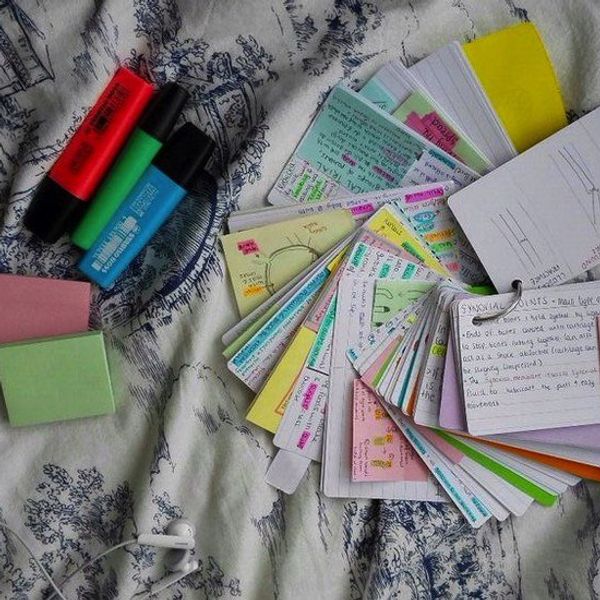I can’t be the only person who has run into this issue. I’m trailing through the week, and I know there is a test, but it gets pushed to the back of my mind until the last moment. It becomes Thursday night and I haven’t studied for a unit exam, and all of a sudden there's a test the next day. Side note: of course I study, but in panic, it can sometimes seems like it feels like I haven’t studied, and of course I’m being dramatic.
In case you find yourself in this situation, and it’s been a while since you’ve taken a serious look at your materials, my advice to you, my friend.
1. Find a place that is just uncomfortable enough that you don’t fall asleep.
It probably shouldn’t be your room. I don’t even allow myself to do any studying in my room because my mind associates it with sleeping and eating. It's good to find a quiet place possibly far away from my dorm where the people and noise are limited. However, sometimes the places I end up have a lot of people. The library is great for studying, and there are plenty of places tucked away in various buildings that often only the students who are in the building often know of. For example, a lot of my theater major friends study in the landings near the door entrances of the theater. There are also a lot of music majors who study in the student lounges of the music hall and the upper levels of the performing arts centers. Take a look around your area of study's building if you have one. Chances are there are good study spots all over.
2. Make sure you have appropriate materials.
Paper, notebooks, textbooks, reading books, highlighters, page flags, magnifying glass, computer -- anything that you need for the classes. Writing and typing notes up really helps to jog the memory.
3. Also have any other needed items.
Glasses, eye drops, watch or clock, headphones -- the stuff that helps you study especially when you're tired.
4. Take a break.
30/30 is a neat phone app that times a schedule. You type in your schedule, and it acts as a timer with an alarm telling you to move on. Breaks are really good especially when there is an information overload. Granted, you shouldn’t wait this long to start studying, but if you have already studied, breaks are good to take. You can listen to some music, eat some actual food, talk with people, social media your study woes, get caught up on some emails, and more.
5. Listen to music.
If you listen to music when you study simply to block out other sound, listen to something with no words. Because I am a music major and also associate music with movement, I tend not to listen to anything when studying. If I had to, I would recommend some good Baroque music or dub-step (or whatever that new kind of music is). It sounds weird, but it’s harder to concentrate when there are words.
6. Make sure to have food and drink.
Water or another beverage and something that can easily be eaten are good to have around so you don’t have to get up to get food nor do you have to sit through your stomach rumbling when you’re hungry. It’s also good to eat healthful brain food to help power through study sessions. Make sure it can be eaten by hand so you don't have to mess around with utensils, and it's not messy. According to some of my past teachers, gum and hard candy is also helpful when studying. I've heard that having an aroma when you study and then having around when you test might help with remembering things.
7. Just do it.
Is that the Nike catchphrase? They do have some nice stuff, and their words are right on. At the end of the day, literally the end of the day, there's nothing to it but just to do it. Studying can be painful, but it's also necessary. Plus, it's well worth it if you can pull off the grade.
Granted, all of this can help "normal" studying as well as "cramming."
Why should you trust me? How do I know what I'm talking about? Well, I am a terrible tester. I cannot, for the life of me, do well on any test that I take. My least favorite form of tests are multiple choice, but I really don't enjoy any kind of exam. However, I've used this advice that I've received from friends and professors and other various sources, and it does work. It has saved my grade more than once, and now I don't have to get to the point to where my grade needs a lot of saving. Using some of this advice from the get-go can help in the future. So go ahead and start reading, write notes, memorize, listen to that Mahler symphony, study that Bach score, learn those musical lines. Even if it might not seem fun at the time, it will be more fun in the long run when you can successfully do things in class and not worry about grade marks.
Break a leg, everybody.




















